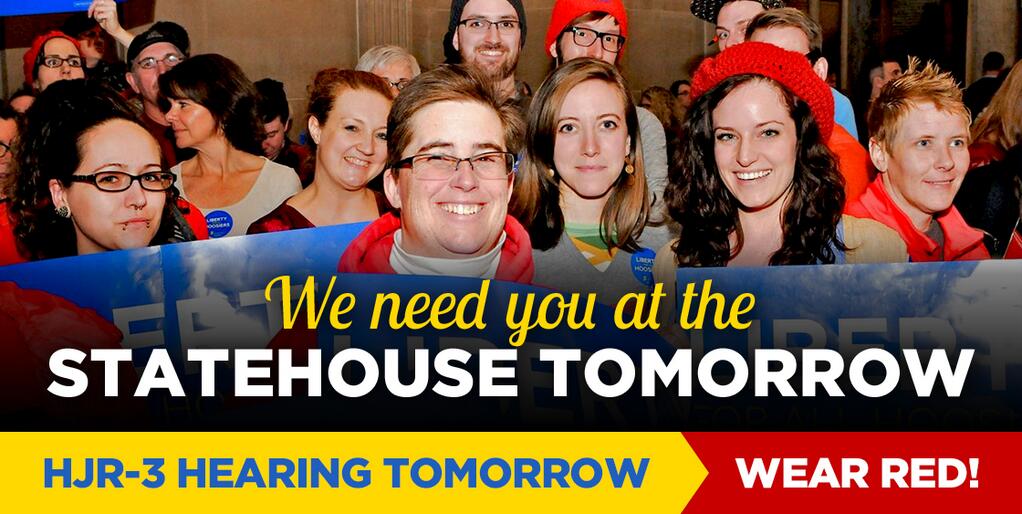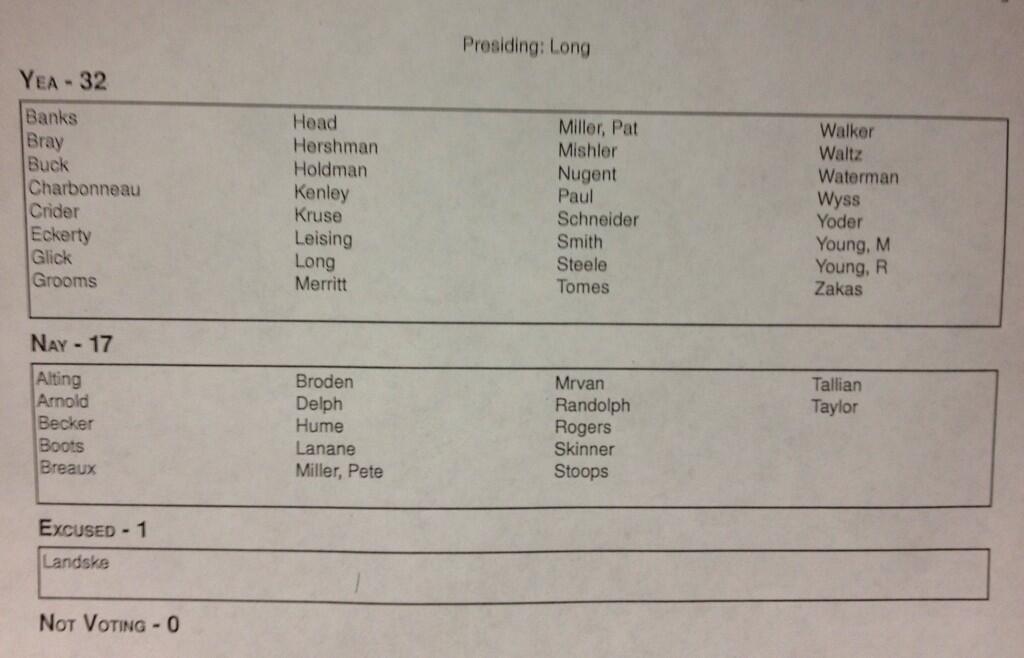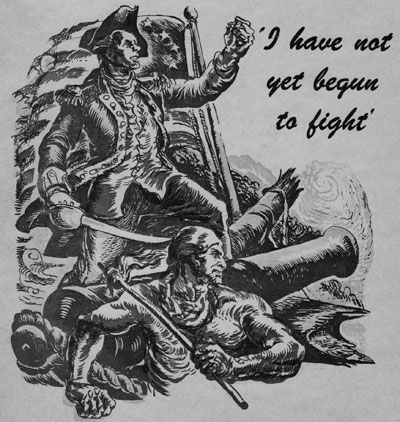The End of HJR-3 for 2014 (with some thoughts on HB-1153)
Because in the past, I’ve been terrible about writing down the follow-up of the Indiana Marriage Discrimination Amendment, here’s a wrap-up post in case this comes up again in two years – HJR-3 passed through the state legislature, but we essentially “won” because we succeeded in keeping it off the ballot in 2014.
After my January 24th post, the amendment moved to the floor of the House of Representatives on January 27th. Stephanie and I attended the hearing at the Statehouse for that event, where they opted to remove the second sentence of the bill:
“A legal status identical or substantially similar to that of marriage for unmarried individuals shall not be valid or recognized.”
The amendment now reads only “Only a marriage between one (1) man and one (1) woman shall be valid or recognized as a marriage in Indiana.”
This is significant because the second sentence had significant problems of interpretation that made it possible to discriminate against anything that resembled a domestic partnership, and threatened things like powers of attorney, living wills and directives, the ability to visit a same-sex partner in the hospital and other ramifications. Similar language in other states’s bills (Ohio, Kentucky) created problems for same-sex couples.
The companion bill – HB 1153, which was intended to “explain the legislative intent” of the second sentence died quietly in the House of Reps because it was no longer relevant. Did I ever post the content of HB-1153? I don’t recall. But here it is, and it reads as a roster of why the second sentence was a problem:
House Bill 1153
House Bill (H)
Authored by: Rep. P Eric TurnerIntroduced Version
HOUSE BILL No. 1153
_____
DIGEST OF INTRODUCED BILL
Citations Affected: IC 1-1-5.6.
Synopsis: Marriage amendment ballot language. Requires that the question of approval of the constitutional amendment concerning marriage proposed by the 117th general assembly be placed on the 2014 general election ballot if the amendment is agreed to by the 118th general assembly. Prescribes the ballot language for the question. Describes the legislative intent of offering the constitutional amendment.
Effective: Upon passage.Turner, Thompson
January 9, 2014, read first time and referred to Committee on Judiciary.HOUSE BILL No. 1153
A BILL FOR AN ACT to amend the Indiana Code concerning marriage.
Be it enacted by the General Assembly of the State of Indiana:SECTION 1. IC 1-1-5.6 IS ADDED TO THE INDIANA CODE AS A NEW CHAPTER TO READ AS FOLLOWS [EFFECTIVE UPON PASSAGE]:
Chapter 5.6. Marriage Amendment to the State Constitution
Sec. 1. As used in this chapter, “marriage amendment” refers to any amendment to Article 1 of the Constitution of the State of Indiana concerning marriage that was proposed by the one hundred seventeenth general assembly (P.L.231-2011) and agreed to by the one hundred eighteenth general assembly.Sec. 2. The general assembly intends and establishes that the purpose of the marriage amendment is to restrict the state, through legislative, executive, or judicial action, from creating or recognizing a legal status between unmarried individuals equivalent or substantially similar to marriage between one (1) man and one (1) woman. The first sentence of the marriage amendment prohibits the recognition of marriage between persons other than one (1) man and one (1) woman. The second sentence of the marriage amendment prohibits the state from circumventing the mandate of the first sentence by creating or recognizing a legal status equivalent or substantially similar to marriage by a different name.
Sec. 3. The general assembly intends and establishes that the marriage amendment does not prohibit or restrict in any way:
(1) the extension of employment benefits by private sector employers, political subdivisions of the state, or state educational institutions to any beneficiary designated by an employed individual;
(2) the adoption and enforcement of local ordinances granting to any category or class of persons equal opportunities for education, employment, access to public conveniences, access to accommodations, or acquisition of property or to rent property;
(3) an individual from entering into or enforcing terms of a power of attorney, a will, a trust, or another similar lawful agreement or instrument (regardless of name) established for the benefit of another person;
(4) an individual from giving or enforcing a lawful consent or other instrument (regardless of name) that grants powers, rights, or privileges to, imposes obligations on, or provides for the use by or transfer of property to another person;
(5) the protections provided under Indiana’s domestic violence laws or who may qualify for protection from domestic violence; or
(6) action by the general assembly to protect or provide for the property, health, or safety of unmarried persons by appropriate legislation.
SECTION 2. [EFFECTIVE UPON PASSAGE] (a) If the amendment to Article 1 of the Constitution of the State of Indiana concerning marriage proposed by the one hundred seventeenth general assembly (P.L.231-2011) is agreed to by the one hundred eighteenth general assembly, the amendment shall be submitted to the electors of the state at the 2014 general election in the manner provided for the submission of constitutional amendments under
IC 3.
(b) Under Article 16, Section 1 of the Constitution of the State of Indiana, which requires the general assembly to submit constitutional amendments to the electors at the next general election after the general assembly agrees to the amendment referred to it by the last previously elected general assembly, and in accordance with IC 3-10-3, the general assembly prescribes the form in which the public question concerning the ratification of this state constitutional amendment must appear on the 2014 general election ballot as follows:“PUBLIC QUESTION #1
Shall the Constitution of the State of Indiana be amended by adding the following language to Article 1:“Section 38. Only a marriage between one (1) man and one (1) woman shall be valid or recognized as a marriage in Indiana. A legal status identical or substantially similar to that of marriage for unmarried individuals shall not be valid or recognized.”?”.
(c) This SECTION expires July 1, 2017.
SECTION 3. An emergency is declared for this act.
HB-1153 came about to assuage the objections of many legal scholars who had studied the HJR-3 second sentence and its potential effects and pointed out unintended consequences that had already played out in other states with similar language, or that could be raised in Indiana.
The difficulty is that this bill had no teeth at all – it was a piece of legislation, but HJR-3 was an amendment to the Indiana constitution, where it held sway over this bill and potentially trumped it. HB-1153 could be repealed at any time, leaving the full force of the second sentence un-“interpreted” intact to be carried out.
I wonder how much of an impact reading this bill had, actually, on our state legislators. It surely indicated in plain language the many ways that HJR-3 could be interpreted negatively in ways that were punitive toward same-sex couples by our legal system, and spelling out potential discrimination based on HJR-3 that starkly is pretty damning. It may have been intended to remove the sting of HJR-3’s “second sentence” but I think it probably had the opposite effect in that it highlighted all that could go wrong.
After the second sentence of HJR-3 was removed from that bill in the House, HB-1153 was no longer relevant and passed into oblivion a few days later.
The removal of the second sentence in the House was very exciting because it meant that it would be much harder to to get the Indiana Marriage Discrimination Amendment onto the ballot this fall in time for 2014 elections. It would have to be put back into the bill by the Indiana Senate and then voted on by both the Senate and the House before voters could see it.
So the bill passed to the Indiana Senate Rules Committee on February 13th, where they declined to hear any amendments to add the second sentence back in.
There was great drama surrounding the Rules Committee hearing because the GOP caucus met ahead of the hearing, and Senator Mike Delph from Carmel tweeted the results of the caucus meeting – that there were not enough votes to put the second sentence back in – before the hearing happened, alerting the crowd to what was going to happen.
HJR3 second sentence is officially dead in the 2014 IGA. Not enough support to reinsert it on 2nd reading.
— Mike Delph (@MikeDelph) February 13, 2014
That didn’t sit well with Senator President Pro Tem David Long, the caucus head. It’s bad form for caucus members to reveal caucus business.
Then as the committee began to meet, they opened with an anti-gay prayer by William Hunt, New Life Church, invited by Senate chaplain.
#openingprayer at Ind Senate asks God to "convict" Senators into restoring "normative definitions". Not even trying 2 hide bias #HJR3
— Rob Pickett (@rcpickett72) February 13, 2014
The bill sailed through the committee as is, first sentence only, very quickly, although it was noted by many people that this was considered impossible even six months ago:
I can’t believe that just happened. No, really. Six months ago, impossible. #HJR3
— Jennifer Wagner (@JenniferAWagner) February 13, 2014
VICTORY: We just made history, and it's because of you. #HJR3 will NOT be on the ballot this year. Thank you Indiana! pic.twitter.com/nZH2pZfG6y
— Freedom Indiana (@freedom_indiana) February 13, 2014
Senator Mike Delph went on to spend the weekend tweeting his anger about the GOP caucus electing not to add the second sentence back into the bill, and delivering rather passionate lectures on god, same-sex marriage and the responsibilities of Indiana churches to back legislative efforts.
“@MikeDelph: And that folks is our self absorbed Godless culture that is fast tracking our nation to ruin. Point made. Night!” #stopHJR3
— Steph Mineart (@electrasteph) February 14, 2014
It was a very entertaining weekend, and I make sure to screen-cap all of it for posterity.
After that great drama, on Monday, January 17th, the Senate passing the amended version of HJR-3, still without the second sentence, through the full Senate.
This was the vote count:
The passage almost seemed anti-climatic, except for some really great speeches delivered by Senators on the floor – Jean Breaux, Karen Tallian, Jim Arnold, Tim Lanane, and Greg Taylor all spoke passionately against HJR-3. It was cathartic to hear them. At the end…
BREAKING: Senate passes amended version of #HJR3. The anti-freedom amendment is officially off the ballot in 2014! pic.twitter.com/3B8EF0WuCp
— Freedom Indiana (@freedom_indiana) February 17, 2014
Ultimately, HJR-3 isn’t dead. It still could be passed through another state legislature in 2015 or 2016 and be on the ballot in 2016. I’m not sure which version could or would be considered, so it’s worth keeping the text of HB-1153 around in order to remind people about that second sentence and what it could do.
It does seem a lot less likely that the amendment will pass in 2016 with several federal legal battles on the horizon, though.
Washington Post – Race on same-sex marriage cases runs through Virginia:
The Supreme Court’s ruling in United States v. Windsor is confronting judges with a paradox. On the one hand, the opinion written by Justice Anthony M. Kennedy and joined by the court’s four liberals noted that defining marriage is traditionally a power reserved for the states.
On the other, the opinion dismissed Congress’s arguments as to why the federal government should recognize only traditional definitions of marriage. It said the arguments were mostly window dressing for unlawful prejudice based on sexual orientation.
State courts and federal judges have embraced that latter reasoning to trump the rights of states, and bans on same-sex marriage have been found unconstitutional since June in New Jersey, New Mexico, Oklahoma and Utah. The Utah and Oklahoma decisions are being appealed to the U.S. Court of Appeals for the 10th Circuit, based in Denver.
In effect, said William Baude, a law professor at the University of Chicago who follows the issue, the majority’s language in Windsor has been viewed as “permission” for judges “who might already have been inclined” to believe there is a constitutional right to marry.
Given this, 2015 and 2016 are going to be really interesting years, politically.



